商务英语词汇的特点及其翻译
- 格式:docx
- 大小:36.90 KB
- 文档页数:2
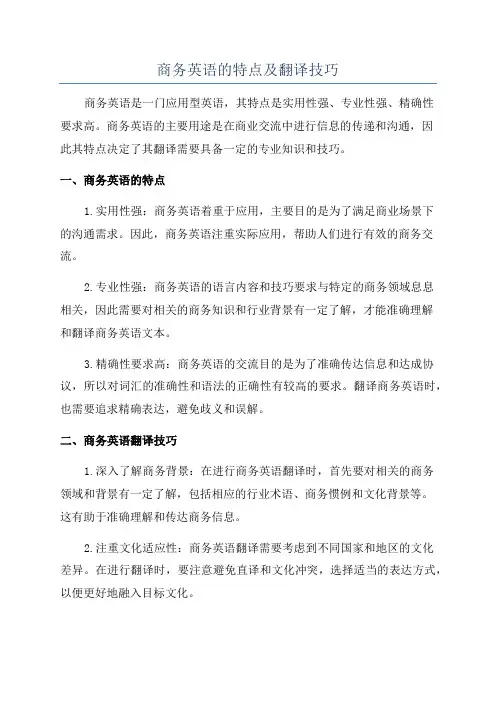
商务英语的特点及翻译技巧商务英语是一门应用型英语,其特点是实用性强、专业性强、精确性要求高。
商务英语的主要用途是在商业交流中进行信息的传递和沟通,因此其特点决定了其翻译需要具备一定的专业知识和技巧。
一、商务英语的特点1.实用性强:商务英语着重于应用,主要目的是为了满足商业场景下的沟通需求。
因此,商务英语注重实际应用,帮助人们进行有效的商务交流。
2.专业性强:商务英语的语言内容和技巧要求与特定的商务领域息息相关,因此需要对相关的商务知识和行业背景有一定了解,才能准确理解和翻译商务英语文本。
3.精确性要求高:商务英语的交流目的是为了准确传达信息和达成协议,所以对词汇的准确性和语法的正确性有较高的要求。
翻译商务英语时,也需要追求精确表达,避免歧义和误解。
二、商务英语翻译技巧1.深入了解商务背景:在进行商务英语翻译时,首先要对相关的商务领域和背景有一定了解,包括相应的行业术语、商务惯例和文化背景等。
这有助于准确理解和传达商务信息。
2.注重文化适应性:商务英语翻译需要考虑到不同国家和地区的文化差异。
在进行翻译时,要注意避免直译和文化冲突,选择适当的表达方式,以便更好地融入目标文化。
3.简洁明了:商务英语的目的是准确传达信息,因此要以简洁明了的语言表达,并避免复杂的句式和词汇。
翻译时也要遵循这一原则,尽量使用简洁的方式翻译商务英语文本。
4.准确性优先:商务英语对准确性要求高,因此在翻译时要注重准确表达。
避免直译、歧义和误解,保证翻译的准确性,以便确保信息的传递和商务交流的有效性。
总结起来,商务英语是一门实用性强、专业性强、精确性要求高的英语。
翻译商务英语需要具备一定的专业知识和技巧,并注重文化适应性、简洁明了和准确性优先。
翻译者应该深入了解商务背景,尽可能准确地传达商务信息,以达到有效沟通的目的。
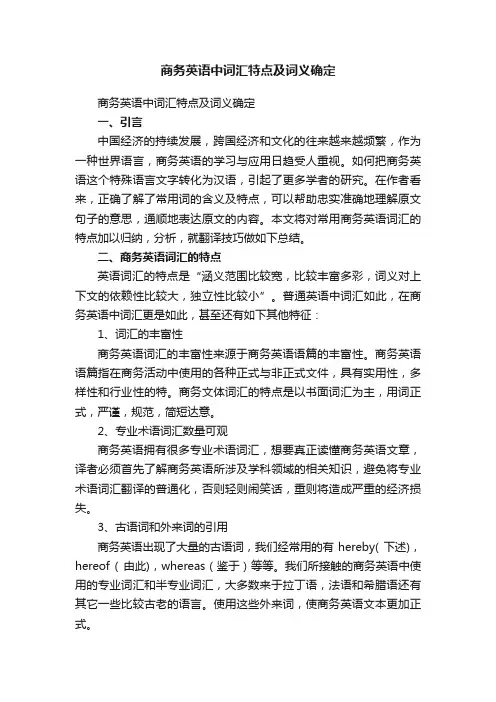
商务英语中词汇特点及词义确定商务英语中词汇特点及词义确定一、引言中国经济的持续发展,跨国经济和文化的往来越来越频繁,作为一种世界语言,商务英语的学习与应用日趋受人重视。
如何把商务英语这个特殊语言文字转化为汉语,引起了更多学者的研究。
在作者看来,正确了解了常用词的含义及特点,可以帮助忠实准确地理解原文句子的意思,通顺地表达原文的内容。
本文将对常用商务英语词汇的特点加以归纳,分析,就翻译技巧做如下总结。
二、商务英语词汇的特点英语词汇的特点是“涵义范围比较宽,比较丰富多彩,词义对上下文的依赖性比较大,独立性比较小”。
普通英语中词汇如此,在商务英语中词汇更是如此,甚至还有如下其他特征:1、词汇的丰富性商务英语词汇的丰富性来源于商务英语语篇的丰富性。
商务英语语篇指在商务活动中使用的各种正式与非正式文件,具有实用性,多样性和行业性的特。
商务文体词汇的特点是以书面词汇为主,用词正式,严谨,规范,简短达意。
2、专业术语词汇数量可观商务英语拥有很多专业术语词汇,想要真正读懂商务英语文章,译者必须首先了解商务英语所涉及学科领域的相关知识,避免将专业术语词汇翻译的普通化,否则轻则闹笑话,重则将造成严重的经济损失。
3、古语词和外来词的引用商务英语出现了大量的古语词,我们经常用的有hereby( 下述),hereof ( 由此),whereas(鉴于)等等。
我们所接触的商务英语中使用的专业词汇和半专业词汇,大多数来于拉丁语,法语和希腊语还有其它一些比较古老的语言。
使用这些外来词,使商务英语文本更加正式。
4、缩略词的普遍使用商务英语中还出现了许多缩略语。
这些词的词义单一,简洁明了。
在使用时要保证规范同时减小误差;既可以又节省时间,又可以提高效率。
常用商务英语缩略语大致有,如 W/B (waybill or world bank 贴现汇票或世界银行),FOB(free on board 离岸价) 等等。
三、商务英语中词义的确定商务英语在词汇应用方面具有很显着的特色。
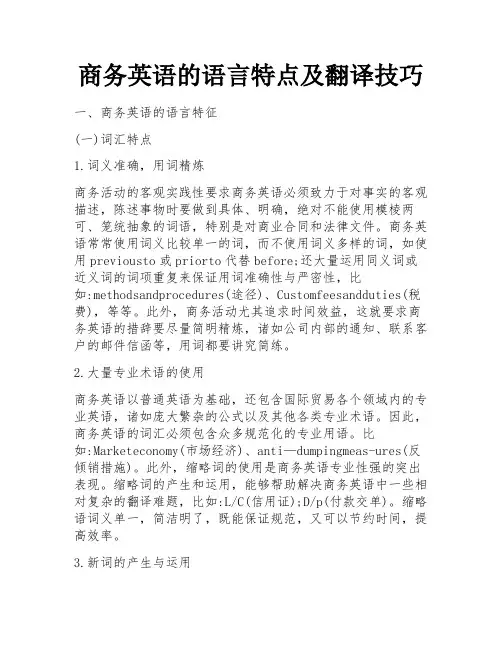
商务英语的语言特点及翻译技巧一、商务英语的语言特征(一)词汇特点1.词义准确,用词精炼商务活动的客观实践性要求商务英语必须致力于对事实的客观描述,陈述事物时要做到具体、明确,绝对不能使用模棱两可、笼统抽象的词语,特别是对商业合同和法律文件。
商务英语常常使用词义比较单一的词,而不使用词义多样的词,如使用previousto或priorto代替before;还大量运用同义词或近义词的词项重复来保证用词准确性与严密性,比如:methodsandprocedures(途径)、Customfeesandduties(税费),等等。
此外,商务活动尤其追求时间效益,这就要求商务英语的措辞要尽量简明精炼,诸如公司内部的通知、联系客户的邮件信函等,用词都要讲究简练。
2.大量专业术语的使用商务英语以普通英语为基础,还包含国际贸易各个领域内的专业英语,诸如庞大繁杂的公式以及其他各类专业术语。
因此,商务英语的词汇必须包含众多规范化的专业用语。
比如:Marketeconomy(市场经济)、anti—dumpingmeas-ures(反倾销措施)。
此外,缩略词的使用是商务英语专业性强的突出表现。
缩略词的产生和运用,能够帮助解决商务英语中一些相对复杂的翻译难题,比如:L/C(信用证);D/p(付款交单)。
缩略语词义单一,简洁明了,既能保证规范,又可以节约时间,提高效率。
3.新词的产生与运用伴随着国际贸易的不断拓展,商务英语也在不断丰富发展着,主要表现为大量反映国际贸易的时展新趋势或先进技术等新词汇的出现。
这些新词汇大多属于复合词语,即按照特定顺序把几个词通过重新排列构成新的词汇。
比如当前信息时代背景下,产生了virtualstore(虚拟商店)、cy-bercash(电子货币)等新词汇。
新词的产生与运用赋予了商务英语更多的时代内涵,为其注入了新的发展活力。
(二)句法特点商务英语有着复杂且层次划分多样的句子结构,句式呈现出严谨、明朗的特征。
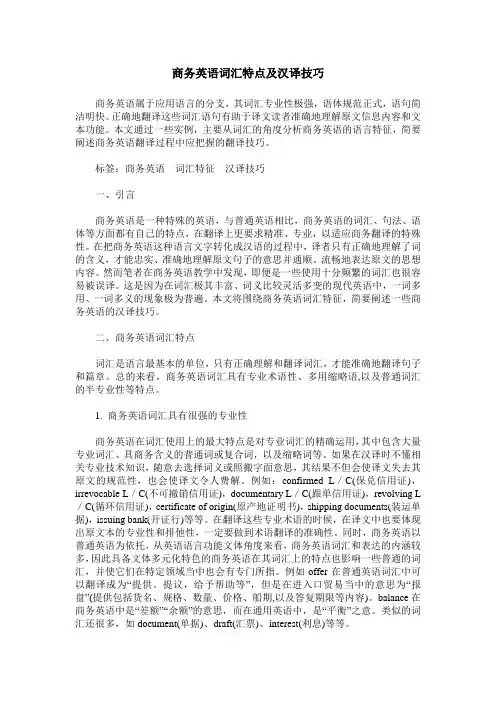
商务英语词汇特点及汉译技巧商务英语属于应用语言的分支,其词汇专业性极强,语体规范正式,语句简洁明快。
正确地翻译这些词汇语句有助于译文读者准确地理解原文信息内容和文本功能。
本文通过一些实例,主要从词汇的角度分析商务英语的语言特征,简要阐述商务英语翻译过程中应把握的翻译技巧。
标签:商务英语词汇特征汉译技巧一、引言商务英语是一种特殊的英语,与普通英语相比,商务英语的词汇、句法、语体等方面都有自己的特点,在翻译上更要求精准、专业,以适应商务翻译的特殊性。
在把商务英语这种语言文字转化成汉语的过程中,译者只有正确地理解了词的含义,才能忠实、准确地理解原文句子的意思并通顺、流畅地表达原文的思想内容。
然而笔者在商务英语教学中发现,即便是一些使用十分频繁的词汇也很容易被误译。
这是因为在词汇极其丰富、词义比较灵活多变的现代英语中,一词多用、一词多义的现象极为普遍。
本文将围绕商务英语词汇特征,简要阐述一些商务英语的汉译技巧。
二、商务英语词汇特点词汇是语言最基本的单位,只有正确理解和翻译词汇,才能准确地翻译句子和篇章。
总的来看,商务英语词汇具有专业术语性、多用缩略语,以及普通词汇的半专业性等特点。
1. 商务英语词汇具有很强的专业性商务英语在词汇使用上的最大特点是对专业词汇的精确运用,其中包含大量专业词汇、具商务含义的普通词或复合词,以及缩略词等。
如果在汉译时不懂相关专业技术知识,随意去选择词义或照搬字面意思,其结果不但会使译文失去其原文的规范性,也会使译文令人费解。
例如:confirmed L/C(保兑信用证),irrevocable L/C(不可撤销信用证),documentary L/C(跟单信用证),revolving L /C(循环信用证),certificate of origin(原产地证明书),shipping documents(装运单据),issuing bank(开证行)等等。
在翻译这些专业术语的时候,在译文中也要体现出原文本的专业性和排他性,一定要做到术语翻译的准确性。
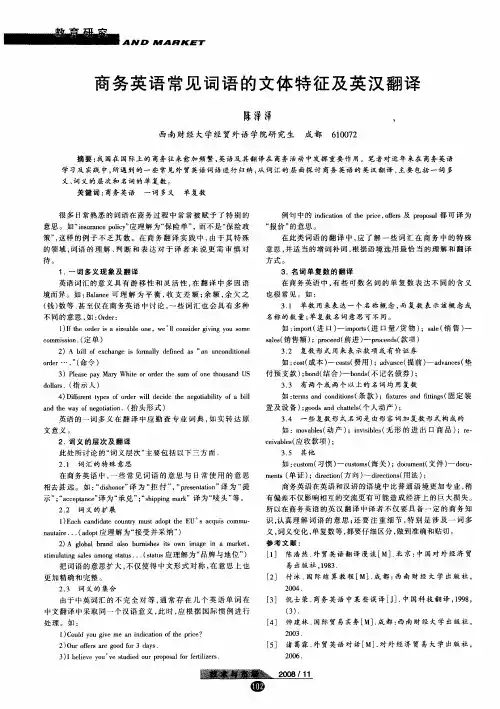
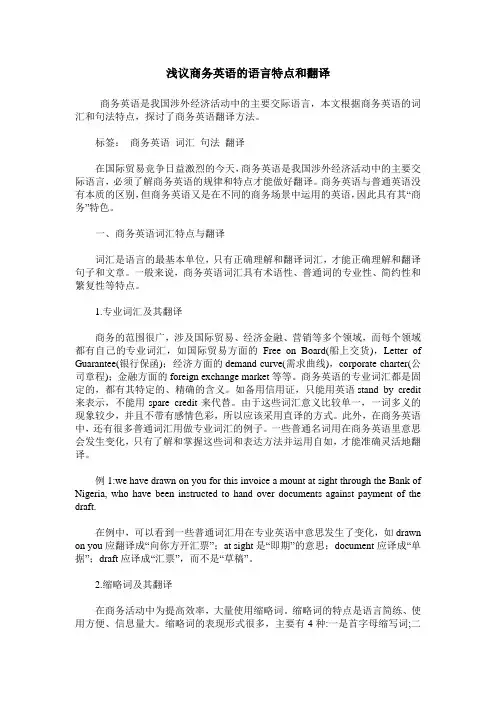
浅议商务英语的语言特点和翻译商务英语是我国涉外经济活动中的主要交际语言,本文根据商务英语的词汇和句法特点,探讨了商务英语翻译方法。
标签:商务英语词汇句法翻译在国际贸易竞争日益激烈的今天,商务英语是我国涉外经济活动中的主要交际语言,必须了解商务英语的规律和特点才能做好翻译。
商务英语与普通英语没有本质的区别,但商务英语又是在不同的商务场景中运用的英语,因此具有其“商务”特色。
一、商务英语词汇特点与翻译词汇是语言的最基本单位,只有正确理解和翻译词汇,才能正确理解和翻译句子和文章。
一般来说,商务英语词汇具有术语性、普通词的专业性、简约性和繁复性等特点。
1.专业词汇及其翻译商务的范围很广,涉及国际贸易、经济金融、营销等多个领域,而每个领域都有自己的专业词汇,如国际贸易方面的Free on Board(船上交货),Letter of Guarantee(银行保函);经济方面的demand curve(需求曲线),corporate charter(公司章程);金融方面的foreign exchange market等等。
商务英语的专业词汇都是固定的,都有其特定的、精确的含义。
如备用信用证,只能用英语stand by credit 来表示,不能用spare credit来代替。
由于这些词汇意义比较单一,一词多义的现象较少,并且不带有感情色彩,所以应该采用直译的方式。
此外,在商务英语中,还有很多普通词汇用做专业词汇的例子。
一些普通名词用在商务英语里意思会发生变化,只有了解和掌握这些词和表达方法并运用自如,才能准确灵活地翻译。
例1:we have drawn on you for this invoice a mount at sight through the Bank of Nigeria, who have been instructed to hand over documents against payment of the draft.在例中,可以看到一些普通词汇用在专业英语中意思发生了变化,如drawn on you应翻译成“向你方开汇票”;at sight是“即期”的意思;document应译成“单据”;draft应译成“汇票”,而不是“草稿”。
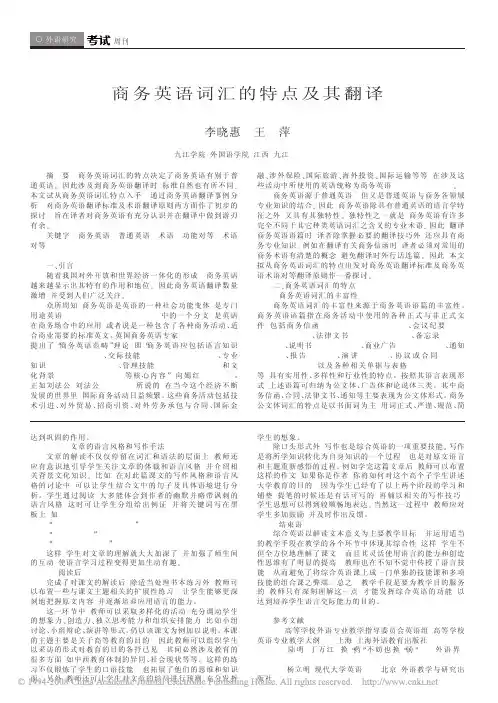
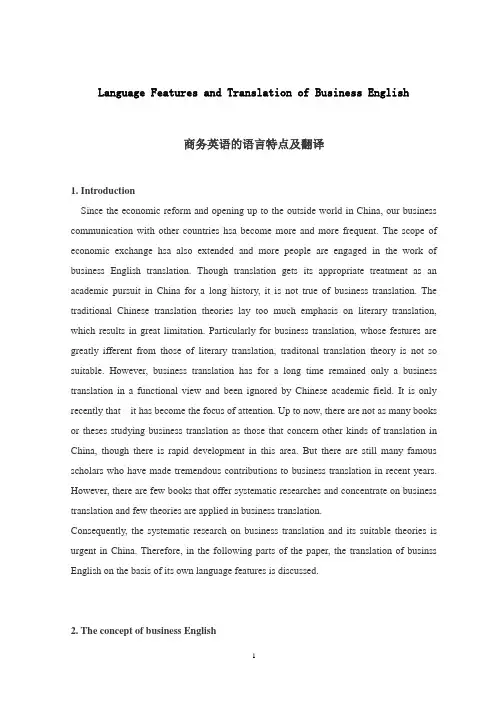
Language Features and Translation of Business English商务英语的语言特点及翻译1. IntroductionSince the economic reform and opening up to the outside world in China, our business communication with other countries hsa become more and more frequent. The scope of economic exchange hsa also extended and more people are engaged in the work of business English translation. Though translation gets its appropriate treatment as an academic pursuit in China for a long history, it is not true of business translation. The traditional Chinese translation theories lay too much emphasis on literary translation, which results in great limitation. Particularly for business translation, whose festures are greatly ifferent from those of literary translation, traditonal translation theory is not so suitable. However, business translation has for a long time remained only a business translation in a functional view and been ignored by Chinese academic field. It is only recently that it has become the focus of attention. Up to now, there are not as many books or theses studying business translation as those that concern other kinds of translation in China, though there is rapid development in this area. But there are still many famous scholars who have made tremendous contributions to business translation in recent years. However, there are few books that offer systematic researches and concentrate on business translation and few theories are applied in business translation.Consequently, the systematic research on business translation and its suitable theories is urgent in China. Therefore, in the following parts of the paper, the translation of businss English on the basis of its own language features is discussed.2. The concept of business EnglishWith the development of the world economy's increasingly globalization, the interactions between China and the rest of the world is becoming more and more frequent. As China's foreign trade constantly forward development, nowaday, our country urgently need a large number of international commercial talents who are mastering foreign languages, understanding the business knowledge, being familiar with international business environment, and being good at cross-cultural communication. Business English is the main communicating language in China's foreign economic activities,which business English plays a role of bridge in this activity. Business English involves marketing, economics, accounting, finance, management science and so on many edge discipline knowledge, and business activities related to foreign trade, technology import, attractting investment, business negotiation, business contract, international business payment and settlement, and foreign insurance scope. Therefore, it is necessary to study the characteristics of business English itself, in order to be accurately regulate use in all fields. Business English is a social function of English variation, is special use a branch of English, English is in business occasions, the application is a contains various business activities suitable for business needs standard English business English to services the business activities as the goal, set practical professional and clear purpose in a body, for international business activities in the people that are identified and accept, and have strong social function of an English variant in today's economic development, international business activities in a world of increasingly frequent, including technology import foreign trade investment promotion foreign service contracting contract and international financial foreign insurance international travel overseas investment international transport business advertising, business activities, all related to the use of English, in all these activities Business English there are two kinds of style, which are formal style and application style. Business style is a style which forms with the production of commodity and the development of trade. The style of business English doesn't pay attention to the beauty of language, but rather stresses the clearity and organization of logic, the accurate rigor of thinking and the preciseness of structure. In the statement, its wording is specific clear andno equivocation. Courtesy is very important in style, which related to the personal accomplishment. Sometimes such little question is the key to success.3. The language features of business EnglishCompared commom English with business English which is a kind of special use language, both of them have similarity in the basic vocabulary, sentence patterns, and the use of grammar, but in specialty vocabulary, language characteristics and other aspects, business English has its own unique features. For this reason, only comprehensive grasp the characteristics of business English language, can people more comprehensive and deep understanding the expression meaning of business English.3.1 Formal and specialized wordingBusiness English involved in business time and business theory and more, and have strong professional. The vocabulary of business English is professional vocabulary, including a large number of professional terms, abbreviations, common words and compound words. Therefore, in the translation of business English , if you want to accurately express information of the original text and let the reader fully understand the original intention, the translator at this time must use the professional standard and equal terms during the ttranslation precess. In addition, when business English is translated, except for the master of two or more than two kinks of languages culture and translation skills, it must be able to manipulate business knowledge, to frequent analyse the context of the content, to master the professional terms of special meaning, more access data and dictionary, and to fundamentally do business English translation well. Because business English is connect with contract and other important documents, Business English is wording rigorous, refined and professional. Therefore, , in order to be accurate, without any deviation, wording must be accurate and precise. In the use of business English, except diction properly, it is necessary to use some inverted sentence, complex sentences, the passive voice and some structure complex clauses to modified sentences and restrictedcontent. Although this makes sentences relatively complex, the meaning is more complete and strict, and won't appear ambiguity when it is read. For example: Pleased to inform you that our counter sample will be sent to you by DHI by the end of this week and confirm it ASAP so that w e can start our mass production (很高兴通知您,我们的回样将于本周末用特快专递给您,请尽快确认,以便我们开始大批生产), in this sentence, "inform" is used as a object, besides the "that" clause and personal pronouns"you", there is a "so that" purpose adverbial clause in the sentence.Business English has a unique vocation characteristic, a highly professional and business terms. For example, in order to reflect the macroeconomic dynamic index, it basically express "国内生产总值(gross domestic product. GDP)" ,"国民生产总值(gross national product, GNP), etc. In the import and export, the term includes "商业发票"(eommereial invoice), "提单"(bill of landing), 汇票(draft/bill of e-ehange) and so on. Therefore, the language form, vocabulary and content of business Englishis is closely related with the profession, which is carrying the information of business practice and theory. In other words, language form, vocabulary, content, etc of business English is decided by its affiliated profession. It is the carrier of business practice, business theory knowledge, so that it must fully understand the meaning and connotation of business English, and equipe the knowledge of business theory and business practices and other aspects.3.2 Strong purpose and objectivityBusiness English is aiming at performing communication tasks, using communicative skills. In the business meeting, making a phone call and discussing the main scene is purposing. In order to see whether business English language applications have reached some kind of purpose, it must have to look at the time and trade which can get better results. In business English, using English on the trade, it lets others act according to the speaker's opinion, thus gets things wanting to get. In addition, in the use of business English, it must be objective, and avoid some personal colour and subjectivity language. According to the objective principle, the process of translation should realize its function for the expected standard. Fpr example, in the business activity of marketing, to achievebusiness promotion is the first principles of advertising translation. This principle decides that the translators should consider the following three factors in advertising translation: language style, readers' reaction and language culture. First of all, advertising translation must follow the advertising language style according to the original language. According to objectivity principle, business advertising translation should meet the target language style of the advertising language style, that is to say the language must be brief, concise, attractive, and try to make the extraordinary language.3.3 Words correct rigorousBecause business English used in international trade, both parties are in different countries or regions, there exists different language and culture differences, if using more complex business English or vocabulary in the trade, it is likely to produce misunderstandings in the trade between both sides. Therefore, in accordance with the relevant provisions of the international trade, the related letters in both sides using as a prat of trade, are certainly prevent by legal. In the process of trade, both parties, except for advertising styles, should ensure accuracy in using other words, and try to choose a single word or relatively simple to replace some abundant meaning words. Thus it makes both trade parties can fully understand the lexical meanings of each other, and ensures smooth completion of the transaction.When people use business English to express ideas, it is more tend to use the easily understanding words, and clear logical relationship to communicate, and use specific language, accurately convey the information to the others. Business English expresses accurate, not exaggerated, the content must be practical and realistic, especially ensure the accurate data and the strict terms. Communicating information should make the lowest limit themisunderstanding, and the less time spend as far as possible. So it is better have clear ideas, strong logic and logical words, such as "as a result", "for this reason". Expression must be concise, especially fax or phone, some familiar idea can use the term to express, in order to avoid redundant.4. Specific principles of and strategies for the translation of business English4.1 faithfulness principle in the translation of business English4.1.1 Faithfulness is the fundamental requirement for business English translation Business English translating is the primitive type of translating,fitting only for the most prosaic matters.To give a good translation the fidelity to the original text is indispensable and is the most essential. Faithfulness can be said to be the prime issue of good translation. As the genius and character of languages ie very different,it has hence become a common opinion, that it is the duty of a translator to attend only to the sense and spirit of his orginal, to make himself perfectly master his author's ideas, and tocommunicate them in those expressions which he judges to be best suited to convey them. In order to constitute a perfect translation, it is requisite that not only the ideas and sentiments of the orginal author should be converyed, but also his style and mannner of writing, which cannot be done whitout a strict attention to the arrangement of his sentences, and even to their order and construction.Tytler describes a good translation to be,that, in which the merit of the original work is so compltely transfused into another language, as to be as distinctly apprehended, and as strongly felt, by a native of the original work. He deduces three laws of translation which the dissertation's writer believes that they also suit business English translation as well. First, that the translation should give a complete transcript of the ideas of the original work. Second, the style and manner of writing should be of the same charavter with that of the original. Third, that the translatiion should have all the case of original composition. The first law reflects the faithfulness principle in trabslation though it suits all kinds of translation.4.1.2 Equivalence of the concept can assure the fidelity to the original text Faithfulness is the highest standard of judging the success of translation. Thus completely understanding the source language and finding equivalent for the original are the preconditions to guarantee the realization of faithfulness. Only when he really understands the essence of the original,can the translator find eqquivalent for the originaltext. In retrospective translation, the target text must be absolutcly faithful to the original text. In retrospective translation, the target text must be absolutely faithful to the original text. And translators need to saiisfy such requirement :1)to understand every word in the original text; 2) to choose the most equivalent word to the originalone; 3) to make the translation as a whole original text's exact equivalent form though tactical arrangement of the equivalent words. The discovery of textual equivalents is based on the authority of a competent bilingual informant or translator.A textual translation equivalent as defined by Catford is thus: that portion of a target language which is changed when and only when a giveen portion of the source language text is changed. Since chinese and English can conwert into cach other easily in replancing the subject, predicate, object, attribute, adverbial, and complement, equivalentss are of the simple eqal-rank and unit-to-unit type. Thus the translation somehow has character of sequential translation.4.2 Exactness principle in the translation of business EnglishThe principle of "exactness" and the application of this principle in business Engliish translation mean that, in the course of transmitting the original language content into the target language content, translators choose correct words, give exact expression, referring to right with the right name, and present accurate figurre and unit. A word or an idiomatic phrase-word, briefly a code-unit, may be fully interpreted only by means of an equivalent combination of code-units, that is, a message feferring to this code-unit:"every bachelor is an unmarried man, and erery unmarried man is a bachelor." Business English translation is connected with translators must not give free expression in translation.For translating leaners, maybe dictionaries are regarded as very useful tools that provide exact explanation of words. But at most times when translating, dictionaries cannot supply exact meaning all along. Translators must be particular about clearness, vividness, and easiness to understand of the translation text. A translator's task is to reveal the original content instead of its form. As the dicitionary is just a tool helpful to better understand the original text,translators must understand the original text with a correct method, that is tosay, starting from the author's point of view. Starting from the translator's angle to read the original work will not produce good translatiion. So translators should sink themselves into the thinking and fiiling if the source work during thorough reading. When metting a word translators shouldn't immediately think of an equialent word in their own mother language. They need to connect the original word with what it stands for.4.3 Consisteny principle in the translation of Business EnglishThe name, concept and term should be always consistent in translation but the consistency principle of business English translatiion to same extent depends on all translators' common errort and the authoritative agent'sunified rules. Some new words often bring trouble to transletors during the initial stage of its usage circulation. It is really not an easy task to decide how to translate these new words is better. The special term from English to Chinese seems easier to keep consistence than that from Chinese to English. When a term translated into Chinese is widely uesd and an increasing number of people come to know it, it becomes a fixed expression. It is easy to keeping consistence in later use of this term because Chinese is our mother tongue and we easily remenber and learn to use new terms. Many of economic knowledge may create new expression for these terms, such as "overwhelming superiority theory","relative advantage theory","original producing place","changeable currency" and so on. To translate general terms in economic field, translators should refer to international English commerce and trade literature, keeping the stability and consistency of the translated names. The general terms of Chinese almost have fixed expression in English, so translators take the responsibility of matching the translated names of the same concept in both languages.The translators of business English must have a good knowledge of business Chinese and business English, and also be familiar with business practice. It is a pity that the false translation of terms is relatively widespread. If the universal English terms are not used, readers of the translation text will not be able understand it, and translators cannot accomplish the task of transmitting messagess.5. ConclusionHaving introduced the theory of functional equivalence, surveyed some issues of business English translation and the language features of it, explored the applicability of functional equivalence and how it is achieved in business English translation, we are now in a position tomake a conclusion of the paper. On one hand, the thesis endeavors to approach business translation in a functional view, which gives a macro basis to the thesis. Based on the survey of theories of functionalists, the thesis proposes that the rule of function plus loyalty could be regarded as a reasonable principle of business translation and offers some convincingreasons. Based on the analysis of this, free translation could be thought as a major strategy for business translation. On the other hand, the thesis explores a systematic analysis of stylistic features of business English, which has great influence on its translation. After an elementary view od the features of business English the thesis analyzes the characteristics of business English, at lexical, syntactic and textual levels, which connect with the principles and atrategy closely. Based on such analysis, two specific principles, exactness and conciseness are put forward, which are directly guided by functional theoryand derived from the features of business English.With the fast development of world economy, business translation has been becoming more and more significant. Meanwhile, it is also a necessary result of the economic development. Business translation must serve for economic development and be testified by the economic needs and further researches are neened and also will be made on this aspect.To sum up, business English is professional, logical, simple, and complexity. So translation of business English is not only needing deep professional knowledge and basic skills of grammar, but also needing more comprehensive understanding of international trade related terms. At the same time, one must understand the problems which oneself exists in the translation process, and translation skills. In the process of translation, it by no means avoids of interpreting without real understanding of meaning, ignoring the details. In the continual development of foreign trade, business English also need to constantly enrich and develop. Only by constantly learning, accumulate experience, the expandedaspect of knowledge, can one make the translation of business English achieve true standardization border.References:[1] CheLiJuan, JiaXiuHai. The business English translation course ". Foreign economic and trade university B version of the club. 2007 (7)[2] ChengHua. The business English translation "(21 century vocational for teaching business English series) tsinghua university press, 2007, (3)[3] Yang light. "college business English translation course" [M]. Beijing: Peking University press, 2005, (5)[4] CuiChangQing, zhang arm bamboo. The business English [m]. China supplies press, 1995, (10)[5] XiaoManJun. "'s understanding of words, choice and business English the translation of "[n]. Chinese translation press, 2000, (1)[6] ZhangYuJin. The business English teaching and translation of understanding "[m]. Xi 'an jiaotong university press, (3), 2003[7] dream episode, sensitive. "modern business English translation strategy" [n]. Chinese translation for science and technology, 2005 (6)[8] LiYuXiang. "talk about business English language characteristics and translation" [n]. Jiangxi normal university press, 2005, (7)11。
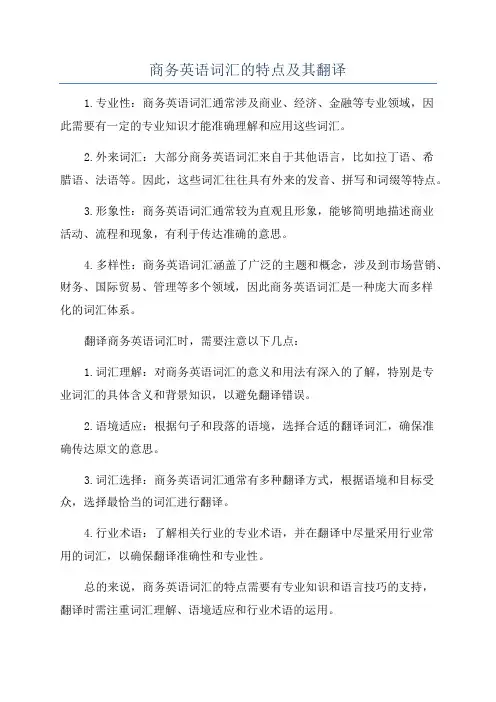
商务英语词汇的特点及其翻译
1.专业性:商务英语词汇通常涉及商业、经济、金融等专业领域,因
此需要有一定的专业知识才能准确理解和应用这些词汇。
2.外来词汇:大部分商务英语词汇来自于其他语言,比如拉丁语、希
腊语、法语等。
因此,这些词汇往往具有外来的发音、拼写和词缀等特点。
3.形象性:商务英语词汇通常较为直观且形象,能够简明地描述商业
活动、流程和现象,有利于传达准确的意思。
4.多样性:商务英语词汇涵盖了广泛的主题和概念,涉及到市场营销、财务、国际贸易、管理等多个领域,因此商务英语词汇是一种庞大而多样
化的词汇体系。
翻译商务英语词汇时,需要注意以下几点:
1.词汇理解:对商务英语词汇的意义和用法有深入的了解,特别是专
业词汇的具体含义和背景知识,以避免翻译错误。
2.语境适应:根据句子和段落的语境,选择合适的翻译词汇,确保准
确传达原文的意思。
3.词汇选择:商务英语词汇通常有多种翻译方式,根据语境和目标受众,选择最恰当的词汇进行翻译。
4.行业术语:了解相关行业的专业术语,并在翻译中尽量采用行业常
用的词汇,以确保翻译准确性和专业性。
总的来说,商务英语词汇的特点需要有专业知识和语言技巧的支持,
翻译时需注重词汇理解、语境适应和行业术语的运用。
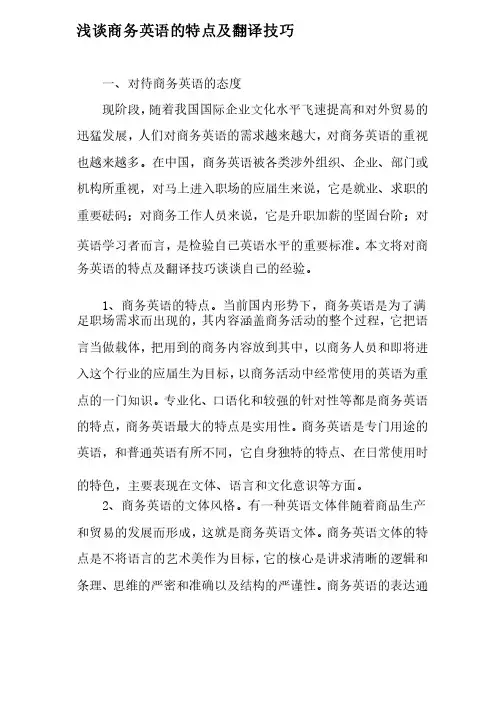
浅谈商务英语的特点及翻译技巧一、对待商务英语的态度一、对待商务英语的态度 现阶段,随着我国国际企业文化水平飞速提高和对外贸易的迅猛发展,人们对商务英语的需求越来越大,对商务英语的重视也越来越多。
在中国,商务英语被各类涉外组织、企业、部门或机构所重视,对马上进入职场的应届生来说,它是就业、求职的重要砝码;对商务工作人员来说,它是升职加薪的坚固台阶;对英语学习者而言,是检验自己英语水平的重要标准。
本文将对商务英语的特点及翻译技巧谈谈自己的经验。
务英语的特点及翻译技巧谈谈自己的经验。
1、商务英语的特点。
当前国内形势下,商务英语是为了满足职场需求而出现的,其内容涵盖商务活动的整个过程,它把语言当做载体,把用到的商务内容放到其中,以商务人员和即将进入这个行业的应届生为目标,以商务活动中经常使用的英语为重点的一门知识。
专业化、口语化和较强的针对性等都是商务英语的特点,商务英语最大的特点是实用性。
商务英语是专门用途的英语,和普通英语有所不同,它自身独特的特点、在日常使用时的特色,主要表现在文体、语言和文化意识等方面。
的特色,主要表现在文体、语言和文化意识等方面。
2、商务英语的文体风格。
有一种英语文体伴随着商品生产和贸易的发展而形成,这就是商务英语文体。
商务英语文体的特点是不将语言的艺术美作为目标,它的核心是讲求清晰的逻辑和条理、思维的严密和准确以及结构的严谨性。
商务英语的表达通常都是淡于修饰、明白易懂,一般不会用到夸张、比喻和拟人之类的修辞手法,这样做的目的是为了提高英语翻译过程的时效性。
商务英语在翻译时要注意尽量避免沉冗老旧的商业套话和术语,要尽可能的使用简单易懂的现代英语表达。
在叙述某件事物时,商务英语的表达通常都会做到具体而明确,绝不会笼统的一概而论或者打马虎眼。
在国际商务英语的使用时还有一个重要的特点就是措辞礼貌,而在汉语中就显得缺少必要的客气,礼貌用语一般只经常见到一个“请”字。
商务英语中则要多很多表达,比如常见的就有“We would be glad to??”“We would appreciate”“It would be appreciate”等表达方法。

商务英语的语言特点语言特点一:要避免使用you-attitude,注意语言表达的态度和语气。
例:According to our records, it seems that you have forgotten to filet he personal data.改为:According to our records, I didn’t find the required personal data.语言特点二:语言表达准确,简洁,商务英语要表达准确,思路清晰,逻辑性强,用具体的语言把信息传递给对方。
用词明白易懂,正式规范,简短达意。
翻译技巧:使用约定俗成的术语,用来指贸易中的概念,例:FOB(free onboard-离岸价格),CFR(cost and freight—成本.保险加运费)避免使用冗长的表达。
例:All applicants who are interested in the job are obligated to provide the names of three references whom we can write to for evaluation of your job performance.改为:All applicants are supposed to provide three references for evaluation of your job performance.语言特点三:专业性强。
商务英语大量使用专业术语。
因此要充分理解商务英语的意义和内涵,必须有商务理论和商务实务等方面的知识。
翻译技巧:掌握专业术语,并注意术语在具体语境中的运用,例一:The seller should present the following documents required for negotiation to the banks.句中和的negotiation应译为“议付”,而不是常用意思“谈判”。
商务英语的语言特点及其翻译摘要商务英语是在商业场合中使用的一种英语,包括国际贸易、金融和通讯。
商务英语具有其独特的语言特点,包括特定的词汇、表达方式和语法结构。
本文将讨论商务英语的语言特点以及翻译商务英语文件时的挑战和策略。
介绍随着世界变得越来越全球化,商务英语已成为国际贸易、金融和通讯中必不可少的交流工具。
商务英语是在商业场合中使用的一种英语,包括书面沟通,如电子邮件、报告和合同,以及口头交流,如会议和谈判。
商务英语与普通英语相比有很多不同之处,具有独特的词汇、表达方式和语法结构。
因此,翻译商务英语文件可能会面临一些挑战,需要采取一些特殊的策略。
商务英语的语言特点商务英语与普通英语相比有很多不同之处。
商务英语的语言特点如下:专业词汇商务英语中使用了很多专业术语,如市场营销、财务、管理等领域的术语。
这些专业词汇对于了解商务英语文件的内容和含义非常重要。
表达方式商务英语文件通常使用正式的、礼貌的和间接的表达方式。
商务英语文件的作者通常需要遵守一定的礼节和规范,以使文档看起来专业和可信。
语法结构商务英语的语法结构通常更为复杂。
商务英语文件通常需要使用复杂的句子结构、从句和动词时态来表达复杂的概念。
翻译商务英语的挑战和策略翻译商务英语文件时可能会面临一些挑战,包括:专业术语的翻译商务英语文件中使用了很多专业术语,这些术语在不同的领域和文化中可能有不同的含义。
因此,在翻译商务英语文件时,需要了解这些术语的含义并选择合适的翻译方法。
翻译正式的、礼貌的和间接的表达方式商务英语文件通常使用正式的、礼貌的和间接的表达方式,这可能在不同的文化中有不同的含义。
因此,在翻译商务英语文件时,需要考虑目标读者的文化背景,并使用适当的表达方式来传达文档的含义。
复杂的语法结构商务英语文件通常使用复杂的语法结构来表达复杂的概念,这可能会使翻译变得更加困难。
因此,在翻译商务英语文件时,需要了解文档的语法结构,并使用适当的翻译方法来传达文档的含义。
商务英语的词汇特征及其翻译作者:周宇来源:《法制与社会》2010年第09期摘要商务英语属于应用语言的分支,其有着独特的词汇特征。
正确地翻译这些词汇特征有助于译文读者准确地理解原文信息内容和文本功能。
本文试着论述商务英语的词汇特征及其翻译,希望对商务英语的翻译有一定的指导意义。
关键词商务英语词汇特征翻译中图分类号:H313 文献标识码:A 文章编号:1009-0592(2010)03-241-01“商务”包括商贸、金融投资、环境保护、城市发展、人力资源、新技术应用、文化艺术等多个方面。
商务英语就是这些商务环境中使用的英语,它是应用语言的分支。
商务英语源于普通英语,因而其具有普通英语的文体特征。
同时,商务英语又是和一定的商务活动相联系,因而其又具有其独特的语言特征。
商务英语的语言特征,首先通过词汇的选择表现出来。
准确地翻译这些词汇特征,有助于译文读者准确地理解原文信息内容和文本功能。
一、专业术语的翻译专业术语(technical terms)具有国际通用性,意义精确,且具有排他性和专门性。
商务英语中的专业术语是商务英语专业性和严肃性的重要表现。
这些专业术语的使用,能有效地传达商务活动中的各种概念,因此需引起特别关注。
在翻译中,一定要做到准确无误。
例如:confirmed L/C (保兑信用证), irrevocable L/C (不可撤销信用证), documentary L/C (跟单信用证), revolving L/C (循环信用证), back to back L/C (背对背信用证), reciprocal L/C (对开信用证), offer (报盘), certificate of origin (原产地证明书), shipping documents (装运单据), Bill of Lading (提单), issuing bank (开证行) 等等。
在翻译这些专业术语的时候,在译文中也要体现出原文本的专业性和排他性,一定要做到术语翻译的准确性。
商务英语词汇特点
商务英语是指在商业领域中使用的英语语言,具有以下词汇特点:
1. 专业术语丰富:商务英语中有很多专业术语,如contract、agreement、proposal、report、budget、deal、negotiation等,这些术语在商业场合中非常常见。
2. 用词正式:商务英语中的用词比较正式,避免使用口语化的词汇和俚语。
例如,“I am interested in the job”应该改为“I am interested in the position”。
3. 用词精准:商务英语中的用词非常精准,避免使用模糊不清的词汇,例如,“I think”应该改为“In my opinion”。
4. 用词简洁:商务英语中的用词比较简洁明了,避免使用冗长复杂的句子。
例如,“We need to discuss the project”应该改为“Let's discuss the project”。
5. 用词规范:商务英语中的用词非常规范,遵循一定的语法规则和拼写规则。
例如,避免使用缩写词或非正式的拼写方式。
总之,商务英语的词汇特点是用词专业、正式、精准、简洁和规范。
掌握这些特点可以帮助商务英语学习者更好地运用英语进行商务交流。
商务信函是国际商务往来经常使⽤的联系⽅式,因⽽其⽤词要准确、恰当,⼜要正式,在翻译过程中应准确表达原⽂的信息;贴切再现原⽂的语⽓从⽽使译⽂符合公函⽂体的风格。
下⾯是店铺分享的商务英语信函的⽤词特点及其翻译技巧,欢迎⼤家阅读! ⼀、商务英语信函的⽤词特点 商务英语是英语的⼀种社会功能变体,是英语在商务场合中的应⽤,其追求的⽬标是⽤最准确、最清晰的商务语⾔进⾏最有效的沟通和交流。
很多知名学者从不同的⾓度对商务英语信函的⽤词特点进⾏研究,笔者认为商务英语信函的⽤词特点主要有以下三点。
1.使⽤专业词汇 ⼤多数商务与普通英语词汇相同,但商务语境赋予其特定的专业意义,⽽专业意义⼜因不同的业务范围⽽异。
因此,翻译专业词汇时需要熟悉这些惯⽤表达。
例如: (1)sales literature。
literature⼀词有“⽂学”,“资料”等意。
若将sales literature直译为“销售⽂学”则与国际贸易业务毫⽆关联,相⽐之下,译⽂“促销资料”更为贴切。
(2)Particular Average。
该词组中的Average源⾃法语,与英语中的risk意思相近,⽽不是⽇常⽤语中的“平均”之意。
该词组应译为“单独海损”,⽽⾮“特别平均”。
2.使⽤⼀词多义的词语 商务英语中同⼀个单词在不同情况下含义⼤相径庭,这就需要译者认真理解,找出恰如其分的词语,准确通顺地表达出来。
笔者试举cover , collect两词并将这些词语的不同⽤法和含义加以⽐较说明。
如下所⽰: (1)Cover:作为名词时,有“保险”之意,例如:Insurancepolicy 保险单,cover note 承保单;作及物动词时,有“包括”,“⽀付”,“给…保险”之意,例如:The credit will cover the invoice, discounting, and any other bank charges.该信⽤证将包括发票⾦额、贴现利息及任何其他银⾏费⽤。
摘要:本⽂试从商务英语词汇特点⼊⼿,通过商务英语翻译事例分析,对商务英语翻译标准及术语翻译原则两⽅⾯作了初步的探讨,以使译者对商务英语有充分认识并在翻译中做到游刃有余。
关键词:商务英语;普通英语;术语;功能对等;术语对等 商务英语源于普通英语,但⼜是普通英语与商务各领域专业知识的结合。
因此,商务英语除具有普通英语的语⾔学特征之外,⼜具有其独特性。
独特性之⼀就是:商务英语有许多完全不同于其它种类英语词汇之含义的词汇和专业术语。
因此,翻译商务英语语篇时,译者除掌握必要的翻译技巧外,还应具有商务专业知识。
本⽂拟从商务英语词汇的特点出发对商务英语翻译标准及商务英语术语对等翻译原则作⼀番探讨。
⼀、商务英语词汇的特点 英语词汇的特点是“涵义范围⽐较宽,⽐较丰富多彩,词义对上下⽂的依赖性⽐较⼤,独⽴性⽐较⼩”。
也就是说当英语中词语孤⽴的时候,我们⽆法说出它的具体意义,因为它具有该词语在使⽤中可能具有的⼀切词义,只有依赖其所在的上下⽂或者该词语同其它词语的搭配或者组合关系我们才能辨别其具体意义,在普通英语中词汇如此,在商务英语中词汇更是如此,甚⾄商务英语词汇除此之外,还具有如下其它特征: 1、商务英语词汇的丰富性www.E 商务英语词汇的丰富性来源于商务英语语篇的丰富性。
商务英语语篇指在商务活动中使⽤的各种正式与⾮正式⽂件,具有实⽤性、多样性和⾏业性的特点。
按照其语⾔表现形式,可归纳为公⽂体、⼴告体和论说体三类。
其中商务信函、合同、法律⽂书、通知等主要表现为公⽂体形式。
商务公⽂体词汇的特点是以书⾯词为主,⽤词正式、严谨、规范、简短达意。
商业⼴告主要表现为⼴告体形式,英语⼴告⽤词多趋于通俗化、⼝语化、简洁、⽣动、并富有⿎动性,其中可能包含⼤量的⼝语词、新造词、杜撰词、外来词。
商务英语论说多出现在为推⼴产品所做的报告或演讲中。
这类⽂体⽤词正式、严谨,因此以书⾯语词汇为主。
2、专业术语词汇数量可观 专业术语是指适⽤于不同的学科领域或专业的词,是⽤来正确表达科学概念的词,具有丰富的内涵和外延,专业术语要求单义性,排斥多义性和歧义性,且表达专业术语的词汇都是固定的,不得随意更改。
商务英语词汇的特点及其翻译
1.专业性:商务英语词汇主要涉及商业领域的专业术语,如市场营销、财务会计、国际贸易等。
这些词汇具有一定的专业性和技术性,需要熟悉
相关行业的知识和概念。
2.多样性:商务英语词汇涉及的范围非常广泛,包括合同、商业信函、会议、谈判、销售和市场活动等各个方面。
因此,商务英语词汇涵盖了大
量不同的词汇类别和表达方式。
3.国际化:商务英语是国际商务交流的语言,因此其中的词汇更加注
重国际化。
大部分商务英语词汇在不同的国家和地区都有相同或相近的表达,为跨国商务交流提供便利。
4.行业、地区和文化差异:尽管商务英语具有一定的国际性,但在不
同行业、地区和文化背景下,商务英语词汇会有差异。
因此,对于不同的
行业或地区来说,理解和熟悉其特定的商务英语词汇是非常重要的。
1.直译法:直接将商务英语词汇翻译成目标语言。
这种方法适用于词
汇在不同语言中具有相同或相似的表达方式的情况。
2.释义法:根据商务英语词汇的含义和上下文,选择最适合的目标语
言词汇进行翻译。
这种方法适用于商务英语中包含有专业术语或文化背景
的词汇。
3.同义词法:根据商务英语词汇的意思,选择目标语言中与其意义相
近的词汇进行翻译。
这种方法可以保持翻译的准确性并传达正确的意思。
4.描述法:通过描述商务英语词汇的功能、特点或用途,来传达其意义。
这种方法适用于目标语言中没有完全对应的表达方式的情况。
无论采用哪种翻译方法,翻译商务英语词汇时需要注意目标语言的语言规范和惯用表达方式,以确保翻译的准确性和流畅度。
同时,也需要充分了解目标受众的语言和文化背景,以便将商务英语词汇的专业意义传达给对方。